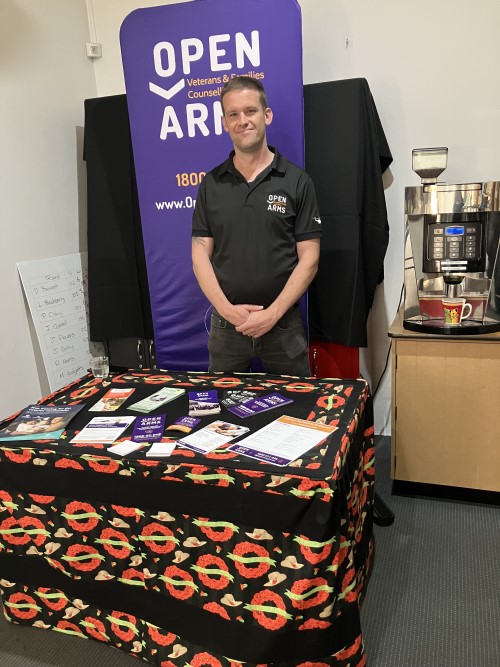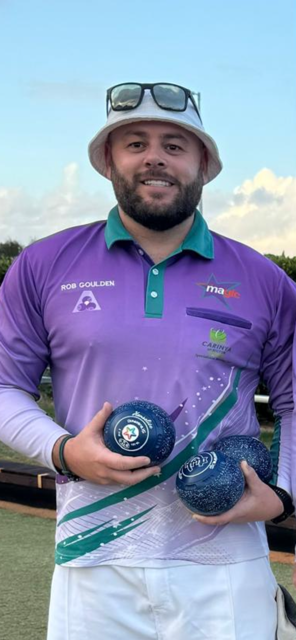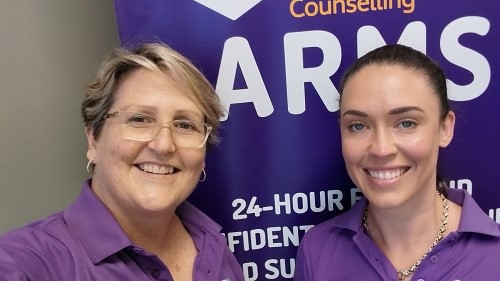Open Arms’ Community and Peer Program celebrates 5 years
It is just over 5 years since Open Arms’ Community and Peer Program was formally opened to veterans and families throughout Australia to help support them through their mental health recovery journeys. Since then the program, through a Lived Experience Workforce, has become an integral part of Open Arms.
Community and Peer Workers are veterans and veteran family members who walk along side Open Arms’ clients and their families. They utilise their lived experience and expertise to understand and overcome client challenges and access the support they need to live their best lives.
We thank those who were there at the beginning, those who have made the program such a success over the past 5 years, and the Lived Experience Workforce who have supported so many veterans and family members. Here are some of their stories.

Peer Joe – ‘Just a dude on the recovery bus’
Just 18 months ago Joe, one of Open Arms’ newest recruits to its Community and Peer Program, admits he was in a bad way struggling with chronic anxiety.
‘I’d always wanted to serve in the Army and when I got out in 2018, I mourned my old life and wondered who I was without that green uniform,’ Joe explains. ‘Over time I became snappy, developed insomnia, was not loving life and my mental health was going south.
‘Added to that, my oldest son’s disabilities had gone to extreme levels. We’d actually lost count of the number of operations and procedures he’d had. After my family and close mates convinced me to get help, I called Open Arms in 2023 and saw a psychologist for 10 months. I haven’t looked back. Not every day is perfect but my anxiety has got so much better.’
Armed with a more positive outlook on life, the Army veteran decided to pay it forward by joining Open Arms later that year to help others get their own lives back on track.
‘A mate sent me the position, told me to apply for it and said he would be angry if I didn’t because it fitted me to a tee,’ Joe says. ‘And I’m glad he did. I haven’t felt this kind of purpose since my time in the green. This was the work I was meant to do and I love it.’
In his new role, Joe describes himself as just ‘a dude on the recovery bus’ who helps veterans to climb into the driver’s seat, put both hands firmly on the wheel and steer their own journey to good mental health.
‘I know what it is like to go down a dark road, make the difficult decision to seek help and discover there is light at the end of the tunnel,’ he says. ‘I am on the same mental health journey as the veterans I help, I am just that little bit further along.’
Joe also hopes that he can help dispel any remaining stigmas around mental health which may still exist for some veterans. ‘There is nothing shameful about seeking help or doing what you need to do to make the best possible recovery,’ he says.
‘I’ve seen the effects my mental health has had on my family. My wife also shared that experience with me. Getting help means I am now a better husband, father and am generally travelling better.’
Joe says that after just 12 months in his new role he has already had a ‘goosebumps’ moment at a community engagement event. ‘Having a client approach me who wasn’t aware of what supports they have available to them,’ he said. ‘I’m now part of their recovery journey. Being involved even in a small component of someone’s recovery is an honour.’
Joe says he is very happy to have joined the ranks of Launceston’s Open Arms Lived Experience Workforce, who are all dedicated to making a genuine difference to the lives of local veterans: ‘I work with an awesome team of Peers and Clinicians and as a team, we help clients to achieve some pretty amazing goals.’

Peer Rob – ‘I realised it was not my role to fix people’
When Rob left the military in 2011 with significant lower leg injuries, Community and Peer work wasn’t on his radar when it came to his dream job.
‘I didn’t know what being a Community and Peer Worker was. I wanted to be a police officer, a firefighter or a paramedic,’ Rob says. ‘After doing some career counselling, peer work actually came in 10th on my list!’
Fast forward to 2019 and, after seeing an ad for the new program, he knew instantly this was the role he had been looking for. ‘I felt that the job description was written for me' Rob recalls.
‘After I transitioned from the Army, I went through some mental health challenges along the way and really did struggle. I knew I could use my experiences to support veterans and family members to overcome challenges in their lives. I understood what they were going through and felt I could draw on those experiences to ensure their journey didn’t have to be as difficult as mine.’
Three months down the track Rob knew he had made the right decision: ‘At that point I had a really heartfelt, deep moment with a client where I had supported him to make a drastic life change. I knew then that it was going to be a very rewarding career for the soul. I can honestly say for the first time, post service, I was genuinely happy. I felt like I had a purpose again.’
Rob says that in the 4 years he was an Open Arms Community and Peer Worker he came to understand the importance of empowering veterans and families to make positive changes in their lives.
‘I realised it was not my role to fix people, rather it was to help them along their journey to make changes if that is what they wanted to do, and to identify what recovery could look like for them,’ he explains. ‘In a peer-to-peer relationship we can use shared experiences and stories to help each other understand what might be happening in the client’s life.
‘Being intentional in how I share my recovery story allows the client to connect to elements and see that recovery is possible. The way they think, feel and act today doesn’t have to be their reality of tomorrow.’
The relationships Rob developed with clients had a significant impact on his own wellbeing. In fact, he credits one of his veteran clients for changing his life for the better.
‘A client and I started going to lawn bowling every Wednesday to help him connect with people and to be part of a group,’ he says. ‘It made such a difference to both our lives, we actually started a bowls group in WA for veterans, families and first responders, which has gone on to make a positive impact in so many other peoples’ lives.
‘I now play competition bowls (and) it is something I do for me. Having that community connection and social engagement fills my cup. I get a chance to recharge and that makes me a better husband and father in the long run.’
While Rob eventually left the Community and Peer Program to seek new challenges within DVA, he has since returned to Open Arms to the Community and Peer Program in a management role.
'I feel very fortunate to be able to continue supporting veterans and family members,’ he explains. ‘Being a Community and Peer Worker changed me as a person, for the better. It helped me to understand who I am and how I could use my experiences to help others. There are times when I miss the people and the work and being invited into someone’s life to help them with their personal growth.’

TUNE IN – it’s a Military Life
The popular Military Life podcast recently interviewed two Open Arms’ Community and Peer Workers (Peers), Jess and Sarah, to shine a spotlight on how their lived experience plays a vital role in helping veterans and families to overcome mental health struggles.
The 30-minute episode was recorded to celebrate the 5-year anniversary of the Open Arms Community and Peer Program. By sharing their military backgrounds and experiences of mental health struggles, Jess and Sarah provide understanding and empathy for people in the veteran community struggling with their mental health and wellbeing.
As a veteran and the spouse of a veteran, Jess (pictured on the right) says having lived experience helps Peers connect with clients on a deeper level.
‘The main difference between our Peer workers and our other services within Open Arms is that we are a non-clinical service so we are not offering counselling,’ explains Jess. ‘We’re helping with that mental health journey with other support services that are non-clinical.
‘It’s not just linking in with support networks, it’s also around helping with figuring out what they’re doing for employment, so linking in with services that can help with job resumes, helping to look for jobs, but also having someone to soundboard ideas off.
‘They might have a milestone happen, a marriage breakdown, some conflict in the family due to mental health issues, they might just need extra support either as a carer of someone with mental health issues or, on the other side, they are the person who has the mental health issues.’
Jess also fully understands the impact that transitioning from military to civilian life has on both individuals and families.
‘Transition, whether it’s for a family member or a veteran, is a huge milestone,’ she adds. ‘The demands that Defence members have – whether they are current serving or once they are ex-serving – are very unique to the general population.’
As the spouse of a current serving ADF member, Sarah sees her role at Open Arms as a great way to give back to the Defence community.
‘Having had a mental health recovery journey of my own, it was really a good chance to jump in and support the community that has not only supported me, but who have so many unique challenges and who also have a lot of amazing strengths,’ Sarah says.
‘As family members and spouses of Defence members, we are constantly transitioning – we are good at it. It is something that we may not necessarily want to do but it is a skill in the end. My clients can be really proud of those skills, it can see them move forward with a positive outcome.’
You can listen to the podcast with Jess and Sarah, on Apple Music or Spotify or visit the Military Life website at www.militarylife.com.au/podcast/#episode183.